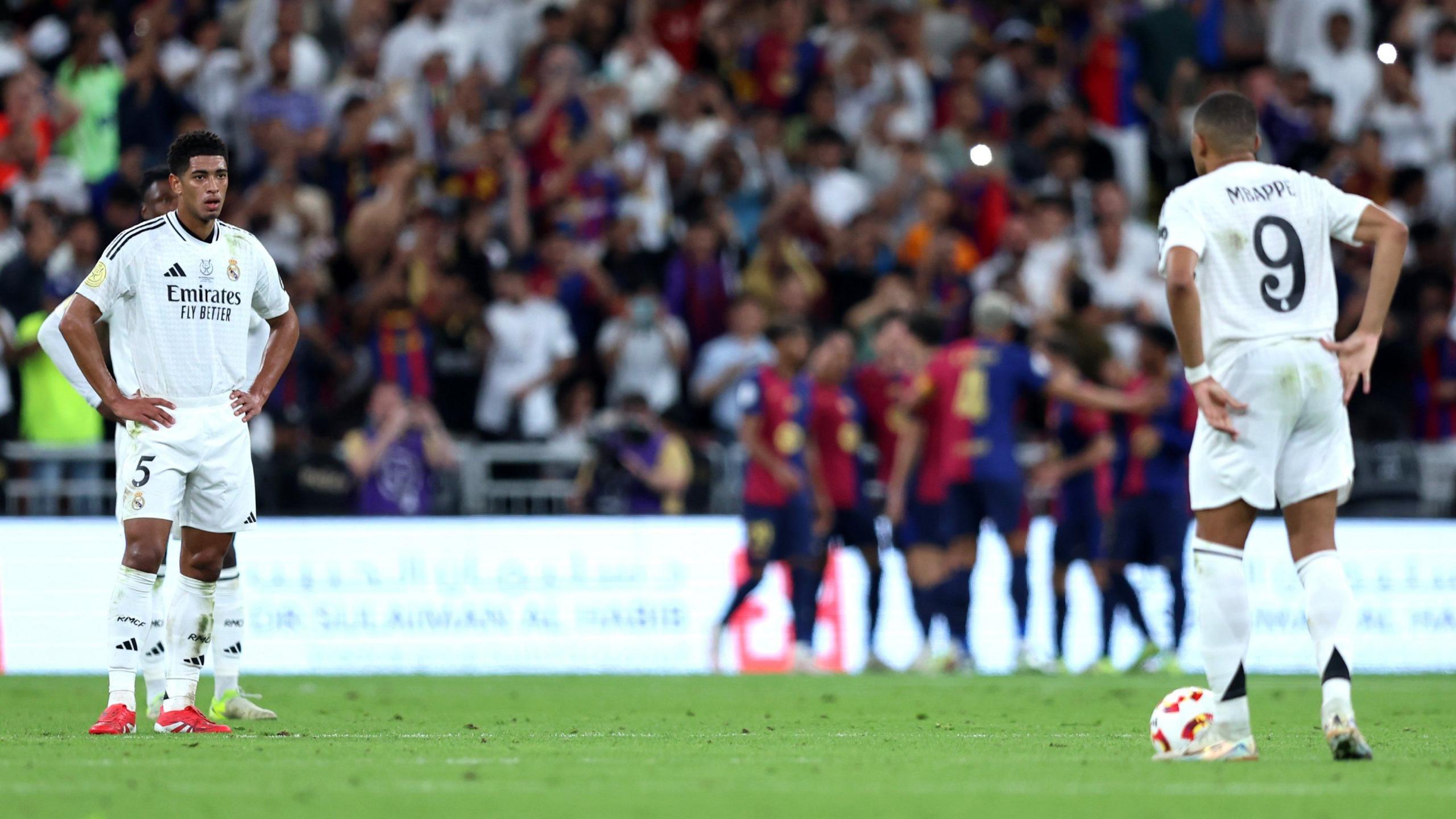Why Barcelona v Real Madrid won’t just define trophies, but trajectories

Football is theatre. Triumph or tragedy, fantasy or farce. But there’s a moment just before the curtain rises, when the stage is still, the lights dim, and there’s a silence that crackles with a mixture of tension and anticipation.
That’s where Barcelona and Real Madrid find themselves now.
As the season winds toward its decisive final act, the two great rivals prepare for a double collision.
Saturday’s Copa del Rey final in Seville will be the first, while El Clasico will follow at Montjuic on 11 May. The outcomes will define not only trophies, but trajectories.
For Barcelona, a chance to complete a remarkable renewal, a chance to show their critics yet again that rumours about their death truly were exaggerated. For Madrid, perhaps a closing chapter, the end of this particular rodeo.
Barca know who they are again
Any antipathy that Barcelona may have had for Real Madrid in the past does not preclude the fact that for years it seemed that they wanted to be them. Ruthless, serial winners, immune to failure. In the past few years that search has been fruitless.
But something changed this season. With Hansi Flick at the helm, Barca have rediscovered that sometimes football isn’t just about the result but also about the importance and value of the journey.
The football is still ambitious. Flick has instilled a kind of emotional clarity, guiding a group of hungry, youthful players with the calm of a manager who knows that the desire to grow and the need to win need not be mutually exclusive. Against Mallorca at the weekend, even with seven changes and a depleted XI, Barca delivered their most statistically dominant performance in years – 40 shots on goal.
Only one went in, but what mattered was the general idea did not change – they all think the same in that team right now. With key starters like Frenkie de Jong, Jules Kounde, Pau Cubarsi and Raphinha rested, Flick effectively revealed his starting line-up for Saturday’s final.
What makes this Barca different isn’t just the tactical framework, it’s the emotional one. Flick has shown an ability to manage expectations and egos with diplomacy.
When Ferran Torres, Hector Fort and Ansu Fati reacted poorly to being benched against Celta two games ago, Flick didn’t scold – he started all three against Mallorca. It wasn’t a punishment or a reward. It was a reminder, a statement of intent. The team is a place for responses, not reactions. In that gesture, he transformed disappointment with purpose.
With several core players fresh and a day more to prepare than their rivals, Barca travel to Seville without excuses. They know what’s at stake, and perhaps more importantly, they know who they are again.
With Lewandowski out, others can shine
No one embodies this rebirth better than Dani Olmo, their only real signing this summer. Forgotten through injury and bureaucratic fog, his season began in silence.
Only injuries have stopped him making an even bigger impression, but he always finds his moment, involved in 13 goals this season in 27 games (10 goals and three assists). Flick must now decide whether to use him from the start in Seville or hold him back as a decisive second-act character. With Lewandowski out, Olmo’s clever movement and invention may be essential.
The spotlight also now falls on Ferran Torres. He is not a classic number nine but, in Flick’s system, he doesn’t need to be. He’s dynamic, he presses well, and he’s the competition’s joint top scorer with five goals.
This is no longer the tentative Torres of old, desperate to impress; this is a striker who is happy to take on all the responsibility.
The final will also be another chance to enjoy 17-year-old Lamine Yamal, key in big games and someone who plays with something much more than mere confidence -total fearlesness. He gives Barca something few clubs have: unpredictability rooted in joy.
And also a chance for Raphinha to claim his place among the best this season, a clear candidate for the Ballon D’Or with 27 goals and 16 assists in La Liga and the Champions League.
For Real, this final is a chance to save face
Bellingham’s adaptation has entered a new phase at Real Madrid. He is no longer merely Madrid’s star – he has become its standard.
Yet Ancelotti’s frequent reminders about the need to show defensive efforts and the meetings he has called to talk about it with him, Rodrygo, Vinicius Jnr and Kylian Mbappe would suggest something is not working. Or make that someone, because Real Madrid cannot play at their best when at least two forward players (Mbappe and Vinicius Jr) – and sometimes three when Rodrygo also goes missing decide that defending is the job of others and not them.
It also means Bellingham then has to do the work of two.
It has been a confusing season for Vinicius Jr, who is set to renew until at least 2029 after turning down astronomical sums from Saudi Arabia, matching Mbappe’s wages and ensuring that he can continue to scatter his stardust in the white of Real Madrid.
On the pitch, he remains Madrid’s eternal risk-taker – capable of brilliance, chaos, and sometimes both in the same play. Although he has impressed much less than last season, he has shown his ability to raise his game when needed.
Only four points separate both teams in the league, but this is not a Madrid at ease as they look back at the clubs’ previous two meetings so far this season. Barcelona didn’t just beat them they destroyed them. The first time, 4-0 in the league at the Bernabeu on 26 October, and the second 5-2 on 12 January in the final of the Spanish Super Cup in Saudi Arabia.
For a club obsessed with image, results like these cut deep. This final is a chance to save face, to gain some kind of redemption.

Barcelona have scored nine goals in two meetings with Real Madrid this season, including a 5-2 win over their arch rivals in January’s Spanish Supercup
Behind Ancelotti’s serenity lies frustration
Carlo Ancelotti, with his future delicately poised, has spent the past months preaching balance and commitment. The expectation – unconfirmed but widespread – is that he will leave after the league campaign concludes to finalise his agreement with the Brazil national team.
Until then, he has to manage the final metres of this marathon.
Santiago Solari is expected to take over for the Club World Cup in the summer. The long-term vision, as it stands, points toward Xabi Alonso beginning pre-season in July.
But one thing he will not do is negotiate what has brought him to where he is today and how he is perceived throughout the world of football. Publicly, Ancelotti insists: “I’m not a coach who uses the whip. If that’s what you want, hire someone else.”
He is, by his own admission, a soft power.
“There’s been talk of too much softness. But I’ve been angry plenty of times,” Ancelotti said this week. “Still, that doesn’t mean I become authoritarian. I work with people, not robots.”
But behind his serenity lies frustration this season. The mentioned calls for more intensity have largely gone unheeded and he considers this season has been one of the hardest of his career to balance egos.
Defensively, the numbers reflect this drift. Only 12 clean sheets in 32 league games. No more than five consecutive wins in all competitions. If they are to salvage this season, it must begin now – with eight victories in a row, Copa included.
Whatever happens in Seville, the season won’t end there. El Clasico at Montjuic on 11 May may still crown the league champion.
Barca will likely arrive with the advantage. Madrid, depending on the outcome of Saturday’s final, may arrive as either reborn heroes or wounded guests.
But that is for another night.







